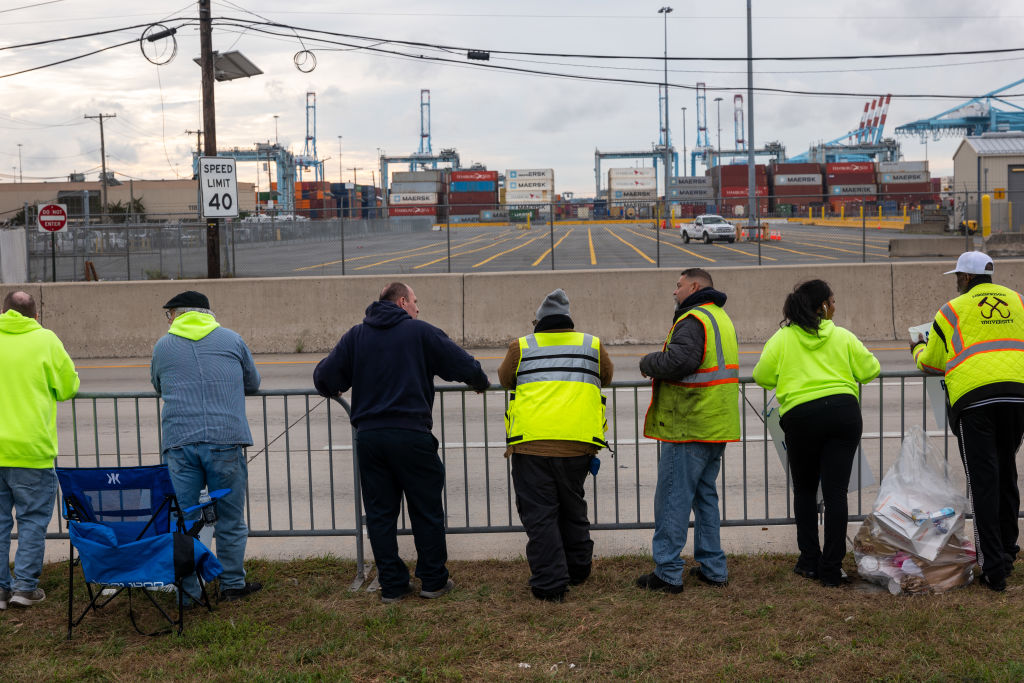The New US Trade Agenda: Institutionalizing Middle-Out Economics in Foreign Commercial Policy
October 20, 2024
By Todd N. Tucker, with contributions from Felicia Wong, Sameera Fazili, Cathy Feingold, Timothy Meyer, and K. Sabeel Rahman

Executive Summary
Over the past few years, the United States has made the most significant change in its approach to trade in generations. Starting in the 1970s, trade policy was focused on neoliberal priorities such as promoting efficiency through tariff and cost reductions and limiting the space for purely national regulation of commerce. This was done with an eye toward benefiting multinational corporations and with the view that trade was primarily a tool for advancing the foreign policy interests of the US (and its image as a global leader). Other goals, such as the quality of domestic jobs or environmental sustainability, were an afterthought. In recent years, however, a new set of values has started to guide US engagement with the global economy, with working class power, climate sustainability, and supply chain resilience at the core of a new approach to global leadership.
While evidence of this new approach can be found throughout the executive branch, it is perhaps most clearly evidenced in the Office of the US Trade Representative (USTR) under the leadership of Ambassador Katherine Tai. Since assuming office with the unanimous, bipartisan support of the US Senate in March 2021, Tai and her agency have laid out an ambitious new US trade policy agenda—one that has started to bear fruit for workers, industries, and the environment.
To take stock of these changes, the Roosevelt Institute convened a study commission of scholars, former policymakers, and labor leaders. Some are longtime trade experts, others economic policy generalists with a bird’s eye view of how trade connects to other economic policies. We sought to better understand how trade policy got to where it is and to sketch out ways this trade agenda could be refined and expanded by future policymakers.
This stocktaking report summarizes our takeaways from the commission. However, nothing here should be taken as consensus recommendations or the group’s full range of ideas for the future of trade policy. Rather, the report represents our attempts to identify—through a group-informed process—fruitful areas for analysis and action in the months and years ahead.
The report is divided into three sections based on the following themes:
- Producing what matters: Trade policy should be in service of the emerging theory of economic growth, rather than pursued for its own sake. Future trade negotiations should focus on problem-solving around production challenges in specific sectors, with the goal of deepening competition and promoting sustainable economic development at home and abroad.
- Consuming with purpose: Past trade policies have been sold through emphasizing their benefits to US consumers in the form of lower prices. The new strategy organizes American consumers to use their collective strength as a $3.8 trillion import market (the world’s largest) to push countries, producers, and importers to follow high-road practices. In other words, access to the US market is a privilege, not a right, and “consumption power” through trade enforcement is how the privilege is managed.
- Personnel is policy: Who serves in government and who government consults is vital to good policy outcomes. Trade policymakers, career staff, and expert advisors should be willing and able to build on this new trade policy model and should reflect America’s full diversity.

"In recent years, however, a new set of values has started to guide US engagement with the global economy, with working class power, climate sustainability, and supply chain resilience at the core of a new approach to global leadership."
Foreword
By Felicia Wong, President and CEO of the Roosevelt Institute
In planning this first-of-its-kind study commission on trade policy and the Office of the US Trade Representative (USTR), the Roosevelt Institute team asked: Why us, and why now?
First off, it is our job to lift up and celebrate the legacy of Franklin and Eleanor Roosevelt. They remade the US and global economy in much the same way that the Biden administration is trying to do today, by rewarding work and not wealth, using the public sector to shape markets, and preserving our natural resources.1 These efforts are very much in line with the ideas and initiatives that have been developed at USTR under Ambassador Katherine Tai’s leadership.
Second, establishing better trade policy has been a core part of the Roosevelt Institute’s work. It featured as a theme in our flagship 2015 Rewriting the Rules report.2 After trade dominated the 2016 election cycle, we held extensive convenings with Open Society Foundations, New America, the Center for American Progress, and other partners to better understand the fault lines and opportunities around the issue. Trade was core to my own work as the US representative on the G7 Panel on Economic Resilience in 2021,3 and has been a regular part of the portfolio of Roosevelt’s own in-house experts including Joseph E. Stiglitz, J.W. Mason, and Todd N. Tucker.4 Indeed, a glance at our 2017 Sustainable Equitable Trade report will show how a series of Overton-window pushing recommendations from that time have now become conventional wisdom: the value of directing the benefits of trade to regions of the country left behind by globalization, greening production, putting guardrails around corporations’ privileges, and finding new bases for international cooperation with other democracies.
Third, since 2015, Roosevelt has run a personnel project—part of what we now call the Roosevelt Society—that helps develop a pipeline of exciting and innovative people from the academy and civil society and into government. We are pleased that a number of our past and present fellows have served in government and were able to join the study commission, including Joelle Gamble, K. Sabeel Rahman, and Sameera Fazili.
Finally, and most importantly, we believe that now is the right moment to have a deep conversation about trade and how it fits in with the emerging US economic strategy. The COVID-19 pandemic, climate crisis, exploding inequality, and precarious supply chains have brought into question much of the received wisdom about globalization. The US has begun charting a new path with increasing bipartisan support,5 but the exact contours of this path are still ripe for mapping.
The sometimes heated international response to the trade implications of US policies, including the Inflation Reduction Act, Infrastructure Investment and Jobs Act, and the CHIPS and Science Act, suggest there is value in communicating—and actually ensuring—that new industrial strategies are not a zero-sum game, and that increasing support for green manufacturing could drive a race to the top.
In fact, much of the initial criticism of the US’s industrial policy from trading partners has subsided, suggesting that the breaking of established economic norms was both significant and broadly understandable once explained. It is thus no coincidence that many of the US’s closest partners and allies are considering or implementing similar industrial policy packages.
We hope that this study commission serves as a template for future evaluation of making government agencies deliver equitable economic policy for all Americans.
Footnotes and Suggested Citation
Read the footnotes
1Rexford G. Tugwell, The Democratic Roosevelt: A Biography of Franklin D. Roosevelt (Doubleday, 1957).
2Joseph E. Stiglitz, “Rewriting the Rules of the American Economy: An Agenda for Growth and Shared Prosperity” (New York: Roosevelt Institute, May 12, 2015), https://rooseveltinstitute.org/publications/rewriting-the-rules-of-the-american-economy/
3Mark Sedwill et al., “Global Economic Resilience: Building Forward Better: The Cornwall Consensus and Policy Recommendations” (Cornwall: G7 Panel on Economic Resilience, October 2021), https://rooseveltinstitute.org/publications/global-economic-resilience-building-forward-better/
4Joseph E. Stiglitz, “Tricks of the Trade Deal: Six Big Problems with the Trans-Pacific Partnership” (New York: Roosevelt Institute, March 28, 2016), https://rooseveltinstitute.org/publications/tricks-of-the-trade-deal-problems-with-trans-pacific-partnership/.Todd N. Tucker, “The Sustainable Equitable Trade Doctrine” (New York: Roosevelt Institute, March 16, 2017), http://rooseveltinstitute.org/trade-set-doctrine/. See chapter by Mason in Nell Abernathy, Mike Konczal, and Kathryn Milani, “Untamed: How to Check Corporate, Financial, and Monopoly Power” (New York: Roosevelt Institute, June 6, 2016), http://rooseveltinstitute.org/untamed-how-check-corporate-financial-and-monopoly-power/. See also the report by our formerly affiliated Great Democracy Initiative: Timothy Meyer and Ganesh Sitaraman, “A Blueprint for a New American Trade Policy” (New York: Great Democracy Initiative, December 2018), https://rooseveltinstitute.org/publications/a-blueprint-for-a-new-american-trade-policy/.
5See the recent letter by 18 House Republicans—none of whom voted for the IRA—indicating that they would oppose repeal of the law’s clean energy provisions. See Emma Dumain and Kelsey Brugger, “Republican Fight over Green Subsidies Heads toward a Boiling Point,” POLITICO, August 25, 2024, https://www.politico.com/news/2024/08/25/republican-fight-inflation-reduction-act-00176223.
Suggested Citation
Tucker, Todd, Felicia Wong, Sameera Fazili, Cathy Feingold, Timothy Meyer, and K. Sabeel Rahman. 2024. The New US Trade Agenda: Institutionalizing Middle-Out Economics in Foreign Commercial Policy. New York: Roosevelt Institute.





